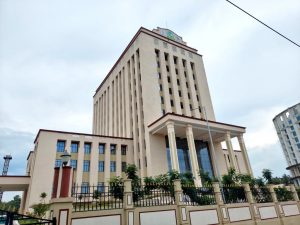Science
Bhubaneswar Launches Integrated Heat and Cooling Action Plan

The Bhubaneswar Municipal Corporation (BMC) and the International Forum for Environment, Sustainability and Technology (iFOREST) have unveiled the Integrated Heat and Cooling Action Plan (IHCAP) for Bhubaneswar, aimed at addressing the escalating challenges of heat stress and the soaring demand for cooling solutions. The report was launched on October 17, 2023, as city officials highlighted the urgent need for an integrated approach to combat rising temperatures and humidity levels.
Developed in collaboration with the Singapore-ETH Centre (SEC), IHCAP seeks to mitigate the impacts of the Urban Heat Island (UHI) effect and increasing energy consumption associated with cooling. BMC Mayor Sulochana Das emphasized the city’s commitment to innovative urban solutions, stating, “IHCAP reflects our vision of a climate-smart city that protects vulnerable citizens and ensures preparedness for the realities of a warming world.”
The report identifies heat stress as a critical issue for urban centers in India. Chandra Bhushan, CEO of iFOREST, remarked, “With IHCAP, Bhubaneswar is demonstrating how cities can break the vicious cycle of rising temperatures and growing cooling demand.” The plan aims to serve as a model for other cities, bridging the gap between mitigation and adaptation while aligning local actions with broader climate strategies at both the state and national levels.
According to the report, heat stress in Bhubaneswar now extends until October. If the Indian Meteorological Department’s (IMD) experimental “Feels Like” temperature threshold is applied, over 230 days in 2024 are projected to be classified as ‘Orange or Yellow’ alert days. The report indicates a significant change in the city’s landscape between 2018 and 2024: built-up areas have increased by 23 percent, while vegetation has declined by 10 percent and water bodies have decreased by a drastic 75 percent.
The temperature difference between Bhubaneswar and its surrounding rural areas currently varies between 2–5 degrees Celsius. Household ownership of air conditioning units has surged from 6 percent to 15 percent—a remarkable annual growth rate of 73 percent—between 2021 and 2023. The report highlights that air conditioners now account for one-third of the city’s electricity consumption, which escalates to nearly two-thirds during the summer months.
To address these pressing concerns, the report recommends several key actions, including the expansion of urban greening initiatives to meet the World Health Organization’s benchmark of 9 square meters of green space per person, restoration of all water bodies, promotion of green roads, development of traffic decongestion plans, and the implementation of the Odisha Energy Conservation Building Codes for all commercial and institutional buildings exceeding 500 square meters.
The report asserts that if implemented effectively, IHCAP could lower surface temperatures by between 0.5 and 9.4 degrees Celsius, depending on the specific intervention, and reduce the city’s energy consumption for cooling by 44 to 67 percent. This ambitious plan reflects Bhubaneswar’s proactive stance in tackling climate change and enhancing urban resilience for its residents.
-

 World4 months ago
World4 months agoSBI Announces QIP Floor Price at ₹811.05 Per Share
-

 Lifestyle4 months ago
Lifestyle4 months agoCept Unveils ₹3.1 Crore Urban Mobility Plan for Sustainable Growth
-

 Science3 months ago
Science3 months agoNew Blood Group Discovered in South Indian Woman at Rotary Centre
-

 World4 months ago
World4 months agoTorrential Rains Cause Flash Flooding in New York and New Jersey
-

 Sports3 months ago
Sports3 months agoBroad Advocates for Bowling Change Ahead of Final Test Against India
-

 Top Stories4 months ago
Top Stories4 months agoKonkani Cultural Organisation to Host Pearl Jubilee in Abu Dhabi
-

 Science4 months ago
Science4 months agoNothing Headphone 1 Review: A Bold Contender in Audio Design
-

 Top Stories4 months ago
Top Stories4 months agoAir India Crash Investigation Highlights Boeing Fuel Switch Concerns
-

 Sports3 months ago
Sports3 months agoCristian Totti Retires at 19: Pressure of Fame Takes Toll
-

 Business4 months ago
Business4 months agoIndian Stock Market Rebounds: Sensex and Nifty Rise After Four-Day Decline
-

 Politics4 months ago
Politics4 months agoAbandoned Doberman Finds New Home After Journey to Prague
-

 Top Stories4 months ago
Top Stories4 months agoPatna Bank Manager Abhishek Varun Found Dead in Well









